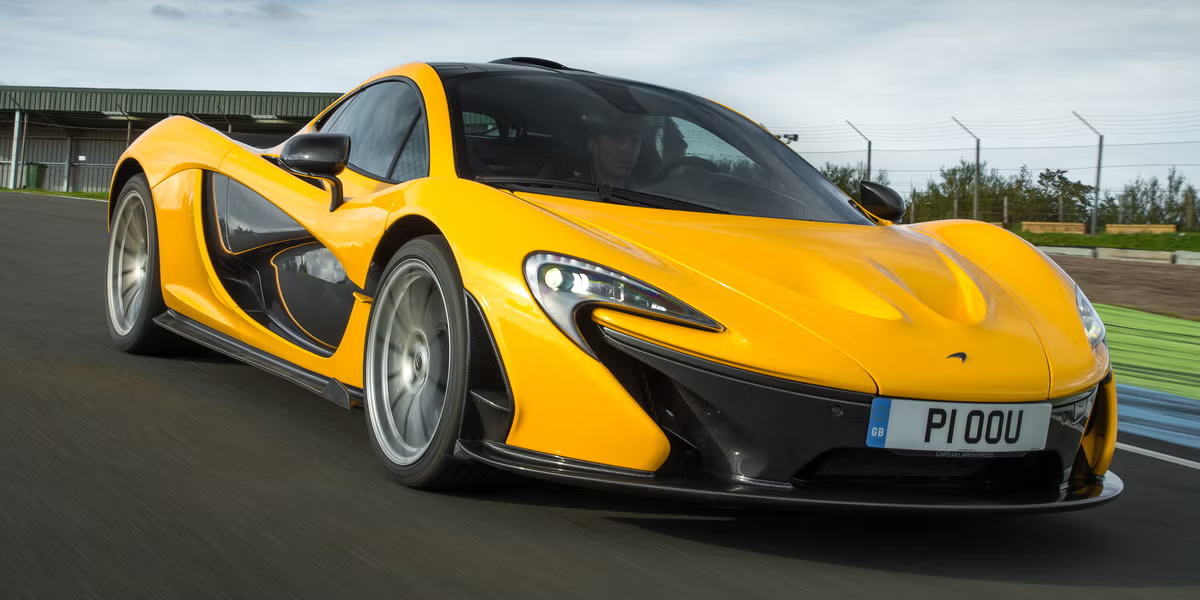McLaren P1-REVIEW IN 2025
READ MORE: Aston Martin DB5-Details in 2025
McLaren P1 is among the most renowned hypercars in the 21st century.
A combination of advanced technology, outrageous performance and space-age style, the P1 was McLaren’s response to the holy trinity of hypercars — Porsche 918 Spyder and Ferrari LaFerrari.
The McLaren P1 is broken down in more details in bullets as presented below:
General Overview
- Model: McLaren Automotive
- Years of production: 2013–2015
- Total Units Produced: 375 units
- Type of the car: Hypercar
- Style: 2-door coupé
- Manufacturing and Assembly Address: Woking, Surrey, England
Powertrain & Performance
- 8-litre twin-turbocharged V8 (M838TQ)
- Electric Motor: E-motor developed by McLaren
- Total Power Output:
- Petrol Engine: 727 hp (542 kW)
- Electric Motor: 177 hp (132 kW)
- Total Power: 903 hp (673 kW) and 900 Nm torque
- Transmission: 7-speed dual-clutch Graziano transmission
- Type of drive: Rear-wheel drive
Electric Features
- Type of Battery: Lithium high-density battery pack
- Electric-Only Range: 11 km (6.8 miles) full-electric range
- Charging Time: Pretty close to 2 hours of plug-in
- Recharging ability: Regenerative braking and recharging at the plug-in
- Hybrid System Focus: Torque fill, zero turbo lag: Power boost
Performance Figures
- 0–100 km/h (0–62 mph): 2.8 seconds
- 0–200 km/h (0–124 mph): 6.8 seconds
- 0–300 km/h (0–186 mph): 16.5 seconds
- Maximum Speed: Speed electronically limited to 350 km/h (217 mph)
- Quarter-Mile Time: 9.8 seconds (or so)
Chassis & Suspension
- Chassis: Carbon-fiber monocoque with MonoCage structure
- Weight: 1,490 kg (3,285 lbs) (dry weight)
Suspension:
- RaceActive Chassis Control (RCC)
- Hydraulic actuated adaptive suspension system
- Height-adjustable, stiffness-adjustable (wet/road)
Brakes:
- Carbon-ceramic discs
- Designed together with Akebono
- Integration of regenerative braking
- Tires: Pirelli P-Zero Corsa, specially developed for the P1
Aerodynamics
Active Aerodynamics:
- Automatic adjusting rear wing (extendable up to 300mm)
- DRS (Drag Reduction System) F1 inspired
- Increased downforce and cooling by use of front flaps
Downforce:
- Up to 600 kg at 260 km/h (161 mph)
- Adjustable for road / track
Design Concentration:
- Venturi tunnels
- Flat underdrawing
- Splitters and diffusers for effective air flow
Technology & Electronics
IPAS (Instant Power Assist System):
- Provides complete electric power enhancement immediately
- Turned on by steering wheel button
DRS (Drag Reduction System):
- Minimizes drag by lowering the angle of rear wing
- Manually activated, like in F1
- Traction & Stability Control: Electronic stability programs, multi-level
Driving Modes:
- Electric only (E-mode)
- Normal
- Sport
- Track
- Race mode (car height and suspension stiffen, optimized aero)
Interior & Features
- Design: Controlled minimalist, weight-saving philosophy
Materials Used:
- Carbon fiber bucket seats
- Carbon fiber and Alcantara trim
- Removable lightweight carpeting
Infotainment:
- Entry-level touch-screen solution
- Navigation and media
- None of the frills, it was constructed to perform
Seating:
- Two-seat configuration
- Carbon racing seats that are light in weight
- Steering Wheel: The idea came from McLaren MP4-23 F1 car
Exterior Design
Styling:
- Forceful, sleek and intentional
- LED lamps with unique McLaren headlamp design
- Dihedral doors (butterfly style)
Paint Options:
- Customisation by McLaren Special Operations (MSO)
- Numerous unique one-off color schemes
Remarkable Design Elements:
- Exposed carbon fiber panels
- Actively adjustable rear spoiler
- Race car-like diffuser and side skirts
Environmental & Emissions
- CO₂ Emissions: 194 g/km (combined)
Fuel Economy:
- Hybrid: ~34 mpg (imperial)
- Depends on driving style
Eco Approach:
- More focused on performance hybrid than environmental sustainability
- Nevertheless, lower emissions for a car in this performance category
Legacy & Impact
Global Ranking in McLaren Lineup:
- Part of McLaren’s Ultimate Series
- Fastest accelerating car
- Displacement: 3.8 liters
- Where: Silverstone Circuit
- World Record Attempted: 238.83 mph
- Was in the wake of the legendary McLaren F1
- Prettier than the McLaren Speedtail predecessor
Direct Competitors:
- Ferrari LaFerrari
- Porsche 918 Spyder
Market Reception:
- Consistently praised for handling, design and innovation
- Considered one of the most balanced hypercars of the era
High-Profile Owners:
- Sizeable number of celebrities and collectors (e.g., Jay Leno, Lewis Hamilton)
Pricing & Value
- Original Price: About £866,000 (approx. $1.15 million USD)
Current Cost (2025):
- Depends on condition and rarity
- Currently trading between $1.5 million – $2.5+ million on the secondary market
Special Editions:
- McLaren P1 GTR: The track-only model, 986 hp
- P1 LM: Road-going variant of GTR built by Lanzante
McLaren P1 GTR – Track-Only Monster
- Publication Date: 2015
- Power Output: 986 hp (735 kW)
Weight Savings:
- Stripped the interior
- Removed road gear
- Production: 58 units
Track-Only Features:
- Roll cage
- Sticky tyres
- Aerodynamic improvement
- DRS fixed rear wing
- Racing suspension
Interesting Facts
- Name Meaning: P1 stands for “Position 1” — the pole position in racing
Formula 1 Influence:
- Extensive tech trickled down from McLaren F1 team
Lap Time Goals:
- Goal: Nürburgring under 7 minutes
- Actual time never officially published
Customization:
- Almost all cars were custom-built
- Clients partnered with McLaren Special Operations (MSO)




Post Comment